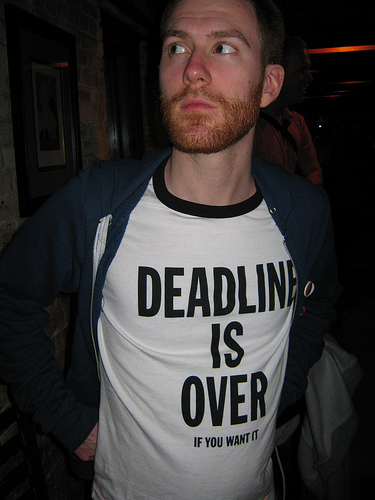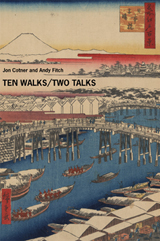The Outsider Writers Collective is holding a fundraiser auction. They’re selling all 5 of their titles in a pretty cool, handmade slipcase. Bidding starts at $27: dirt cheap for this much goodness. Check it out.
Anyone with HTML G sensibilities (have no idea what that means, so or not) has a reading during AWP please comment here with time, place/sarcophagus of shouts. This is a selfish post (but not, people wanna know). My emails bury me, like all. I am at AWP Denver interviewing professors for a job (at BSU/work), but would love to strike (hunger, bass lure, match box, beauty, etc.) mad readings every single night, 7pm to oblivion. List them here. For those in town Tuesday to Sunday of AWP, where should we go, when? And how exactly are the nachos?
1. Dan Hoy and Jon Leon in conversation at Fanzine.
2. Gisele Vienne’s Portraits at DC’s.
3. These brackets are wild.
Start Saturday Right (ie at around 1 in the afternoon)

Josh Cohen double shot! If this doesn’t get you out of bed, it’ll put you back in. JC considers The Sabbath, among other Jewish contributions to the science of keeping Time.
Shmita
The Torah ordains every seventh year a Sabbatical Year, as it says in Leviticus 25: “Six years thou shalt sow thy field, and six years thou shalt prune thy vineyard, and gather in the fruit thereof; But in the seventh year shall be a sabbath of rest unto the land, a sabbath for the Lord: thou shalt neither sow thy field, nor prune thy vineyard.” This septennial respite is known as shmita, Hebrew for “release” or “freeing.” After seven of these seven-year cycles, Leviticus declares a Jubilee, a special fallowing during which all debts are forgiven and all slaves must be manumitted—two tenets not currently observed in the State of Israel, though the agricultural component of the shmita year still is.
And “Thirty Six Shades of Prussian Blue,” which I think was previously mentioned in the Triple Canopy post the other day.
At the Bombsite, Susie DeFord interviews (new to me) poet Damian Rogers.
At Moistworks, noted fictionist and writer-on-music Ben Greenman remembers Alex Chilton of Big Star. This is a short, affecting piece that is worth reading. Also, there are some mp3s to download there.
I remembered beginning to date the woman I’d later marry, playing lots of Chilton’s music for her, and trying to figure out his secret: the way his try-anything-once aesthetic was both forthright and evasive, how he could combine an anarchic sense of humor and an unironic ability to convey pain, his addiction to the brilliant throwaway, his graceless grace. He drew lines back to Slim Harpo and Ronny and the Daytonas and Danny Pearson, so many it seemed he’d get trapped in the tangle. He escaped, again and again–but escaped to what?
And finally, I had always heard that SxSW was some sort of music festival, but apparently it is some sort of international conference for the dork industry. perennial home-girl Rachel Fershleiser and her partner-in-brevity Larry Smith present a flickr album of the nerdiest tee shirts at SxSW, which for some reason is also being referred to in some place as SxSWi. No idea what that’s about but please, don’t anyone tell me, as I’m finding the ignorance very soothing. The picture up top is drawn from their album, as is this one here, which happens to be my favorite of the lot, and on which note I leave you.

Gaga Stigmata

Uber cool Kate Durbin has created a new journal called Gaga Stigmata: Critical Writings and Art About Lady Gaga . Right now it features work from Meghan Vicks (a doctoral student of Comparative Literature at CU Boulder) and htmlgiant comrade Brian Oliu. Here’s the scoop:
Gaga Stigmata: Critical Writings and Art About Lady Gaga is a new technological breed of journal that intends to take seriously the brazenly unserious shock pop phenomenon and fame monster known as Lady Gaga.
Submit:
Critical Work (any format; any length) and Art (Creative Writings, Visual Art, Music, etc.), or any combination thereof, that intelligently interacts with the pop cultural manifestation that is Lady Gaga.
We are also interested in critical writings on the web that already exist, so please call these to our attention if you come across them.
Those who follow Gaga know that she moves as the speed of pop, which is far faster than the speed of critique; therefore, we have chosen the blogger format for now to allow us to keep pace with Gaga. We encourage pieces that are immediate (for example, critical responses to her newest performances, interviews, and music videos), though we are also eager for your more thought-over works as well. If your work is accepted, expect it to be published quickly–likely within a day or two of acceptance. You should also expect to interact with others in the comment boxes of the blog; permitting the peanut-crunching crowd of monsters to further the conversation’s evolution.
Our goal is to eventually create a book of the best works on this site, both in technological and physical form, possibly in collaboration with the Haus of Gaga.
Send all submissions to gagajournal@gmail.com
March 20th, 2010 / 12:35 am
Perchance of a lifetime

Chatroulette screenshot
I want to see this image as a sad reminder of our past, of how divided we are — but, at the gross risk of being insensitive, I see the humor. The humor is not aimed at Jews, Nazis, or the Holocaust, but at the contemporary absurdity of Chatroulette, which has grown more into a role-playing forum than an actual place for strangers to meet, the latter perhaps being most absurd.
Of the many “best of” or “top” Chatroulette screenshots securing their meta-web presences, my favorite is this WWW take on WWII. Here, “Israelite” and “Nazi” (I use quotes because I wonder how much they themselves believe their roles) seem both happily complicit in self-consciously acting out the obvious narrative of their political history, giving a thumbs-up either in solidarity with their respective alliances, or, with an irony only possible in a virtual world, to each other.
The Jew even ducks away from camera, either facetiously, or more solemnly, with a visceral intuition which brings to mind the true horror of hate. Anybody with a flag on their wall is asking to get into a conversation (just like any male in college with an acoustic guitar in his room secretly wants a record deal or to get laid). The Nazi (or, skinhead) has a wonderful smile, which is very out of character, key word being “character,” as that is all we are, and can be, online. If “all the world’s a stage,” then the internet is where we rehearse our lines, sharpening our tongues for a chance at real life.
I Hate Exercise and I Hate Conversation, but I love Ten Talks/Two Walks
I thought I’d give yet another shout-out to Jon Cotner and Andy Fitch’s Ten Talks/Two Walks from Ugly Duckling Presse. Written in the form of “sixty-minute, sixty-sentence walks around Manhattan and a pair of dialogues about walking,” the book’s observational humor often digresses into moments of tastefully awkward poignancy and makes clear, through tugging at the errant threads found in New York City’s human scenery, that everything is truly connected in a glorious form of mental acupuncture: men fighting with lampposts spawn a recollection of a flexible phone conversation, the actions of strangers remind the narrators of their own behavior, and the outside city is shown to be a reflection of the internal time and time again.
As someone who is an outsider to New York (I’ve been there only twice to salivate at the foot of its cultural picture window), Ten Walks/Two Talks grants readers rare and tender access to all the parts of NYC that won’t be shown on Will & Grace anytime soon—and even to some of the parts that may, although they won’t be portrayed in such a koan-like, meditative manner as within this book. If one wished to expand the American Museum of Natural History to include the human specimens found on a collection of random street corners, there could be no better curators selected for the job than Cotner and Fitch. With brand new taxonomic categorizations like “dwarf carrying bag of bananas” and “gold spandex wearing friend to the geriatrics,” this book makes an evocative catalogue of all the city and the imagination have to offer.
Last time I went to the NYC, I paid too much for leggings and ate things that have milk in them when ordered in New York City but do not have milk in them when ordered elsewhere. This was very fun, but next time I think I’ll just walk around and stare.
March 19th, 2010 / 6:23 pm
It is Friday: Go Right Ahead
I am paranoid and belligerent. You?
How I stumbled once drunk into Mary.
A writer’s life is a sentence.
After the picnic, more beer.
Clocks. They annoy.
When I die I want to decompose in a barrel of porter and have it served in all the pubs in Ireland.
Is it OK to pray for an orgasm?
I like to waltz in.
Take it for Christ’s sake and get drunk!
Large beer. Please. Shut up, Mom.
Ha, ha, drink up, death deliverers.
A milky, cold smell…
A. Pope, Tao Lin, and HTML Giant walk into a bar…
This past week, there have been several blogs (plus the mention in the New Yorker) about Tao Lin and the reviews lodged for and against him. To be fair, I haven’t read much of Tao’s work, but I am entrenched in the pure spectacle of “Tao Lin.” Mostly out of boredom but partly because I can’t get away from it, even if I wanted to.
 But consider this, in his Author’s Preface, Alexander Pope argues, “Poetry and criticism [are] by no means the universal concern of the world, but only the affair of idle men who write in their closets, and of idle men who read there.” So I’m back to the question of boredom. Why do we care who says what about Tao? And here, just look back at the comment streams about Tao. People seem to do more than simply “care.” They’re invested! I barely have time to care about the reviews written about my friends, much less any other contemporary. I have no desire to be an idle man writing in my closet, nor an idle man reading there.
But consider this, in his Author’s Preface, Alexander Pope argues, “Poetry and criticism [are] by no means the universal concern of the world, but only the affair of idle men who write in their closets, and of idle men who read there.” So I’m back to the question of boredom. Why do we care who says what about Tao? And here, just look back at the comment streams about Tao. People seem to do more than simply “care.” They’re invested! I barely have time to care about the reviews written about my friends, much less any other contemporary. I have no desire to be an idle man writing in my closet, nor an idle man reading there.
It doesn’t matter much to me whether or not Tao (or any other writer, for that matter) cultivates this particular brand of hype. My concern has to do with the unabashed responses that indicate how very right Pope is. Even this post reinforces Pope’s argument that I’m simply an idle man—or woman in this case—reading in a closet.
Talk Talk
 Last night, I did a reading at Pilot Books. At Pilot’s request, I did an informal craft talk after the reaing. I chose to talk a little about how to approach writing dialogue. What follows are my introductory remarks.
Last night, I did a reading at Pilot Books. At Pilot’s request, I did an informal craft talk after the reaing. I chose to talk a little about how to approach writing dialogue. What follows are my introductory remarks.
Let’s talk about characters when they talk. Stories—mostly—have these things called characters, and more often than not, those characters come in sets, in twos, in threes, in groups and parties and piles. And so then there we are—we writerly types—with our groups and parties and piles and sets of characters, and we have these characters in these rooms we’ve made, these rooms we’ve furnished with all sorts of nice little objects for our characters to look at and consider and think about the history of and maybe to throw at one another—and what then? Why the throwing? What then for the characters there together?
Well, God. Sometimes these characters will have to go ahead and talk to one another. How? How should we—we writerly types—approach the characters talking to each other dilemma? How the heck do we write dialogue? READ MORE >



